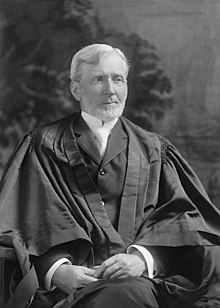Joseph McKenna | |
|---|---|
 McKenna c. 1905–1909 | |
| Associate Justice of the Supreme Court of the United States | |
| In office January 26, 1898 – January 5, 1925[1] | |
| Nominated by | William McKinley |
| Preceded by | Stephen Field |
| Succeeded by | Harlan Stone |
| 42nd United States Attorney General | |
| In office March 5, 1897 – January 25, 1898 | |
| President | William McKinley |
| Preceded by | Judson Harmon |
| Succeeded by | John Griggs |
| Judge of the United States Court of Appeals for the Ninth Circuit | |
| In office March 17, 1892 – March 5, 1897 | |
| Nominated by | Benjamin Harrison |
| Preceded by | Lorenzo Sawyer |
| Succeeded by | William Morrow |
| Member of the U.S. House of Representatives from California's 3rd district | |
| In office March 4, 1885 – March 28, 1892 | |
| Preceded by | Barclay Henley |
| Succeeded by | Samuel Hilborn |
| Personal details | |
| Born | August 10, 1843 Philadelphia, Pennsylvania, U.S. |
| Died | November 21, 1926 (aged 83) Washington, D.C., U.S. |
| Political party | Republican |
| Spouse | Amanda Borneman |
| Education | Saint Joseph's University |
| Signature | |
Joseph McKenna (August 10, 1843 – November 21, 1926) was an American politician who served in all three branches of the U.S. federal government as a member of the U.S. House of Representatives, as U.S. Attorney General and as an Associate Justice of the Supreme Court. He is one of seventeen members of the House of Representatives who subsequently served on the Supreme Court (including two Chief Justices).[2]
- ^ "Justices 1789 to Present". Washington, D.C.: Supreme Court of the United States. Retrieved February 18, 2022.
- ^ "Members Who Also Served on the Supreme Court". Clerk of the House of Representatives. Archived from the original on November 13, 2017. Retrieved March 14, 2013.